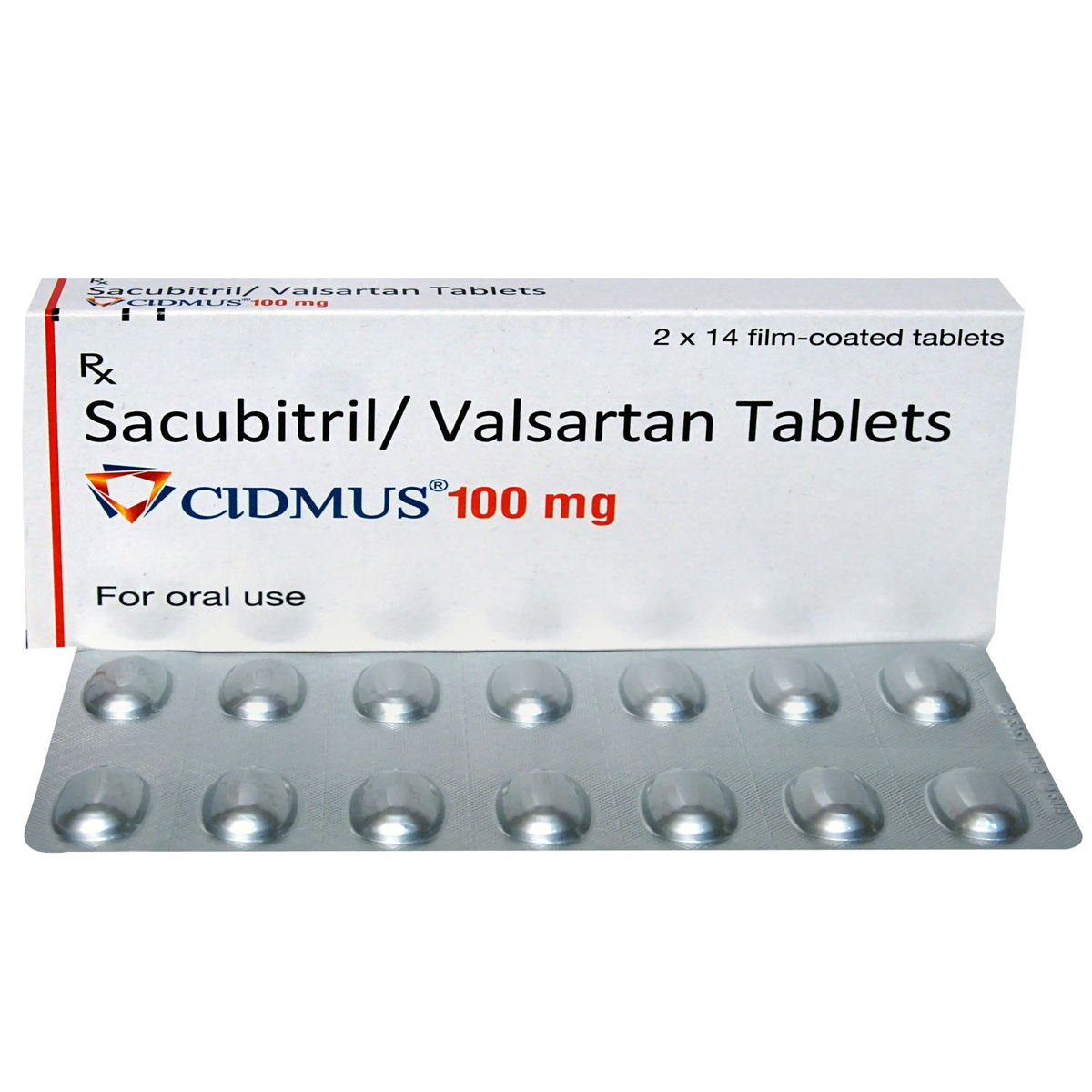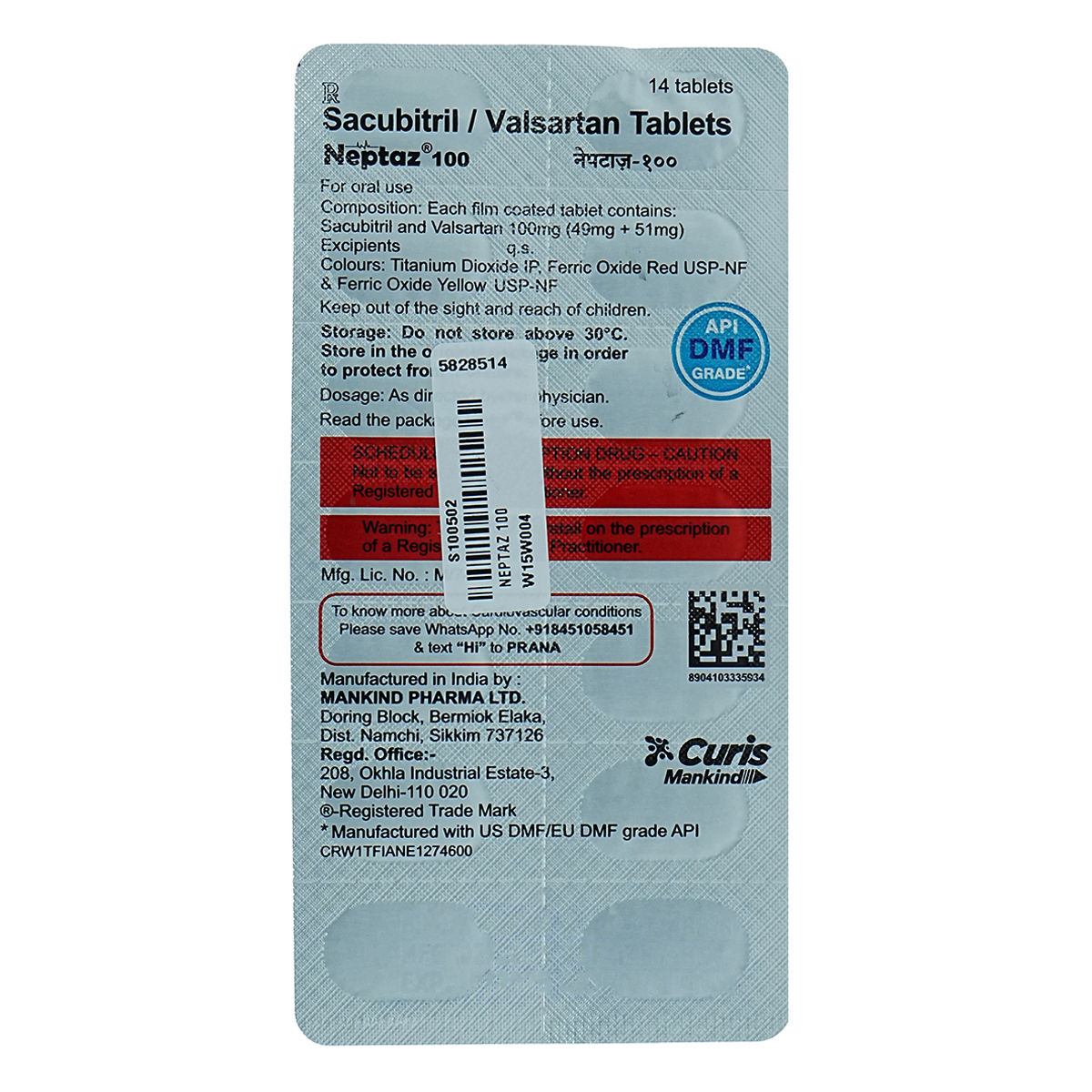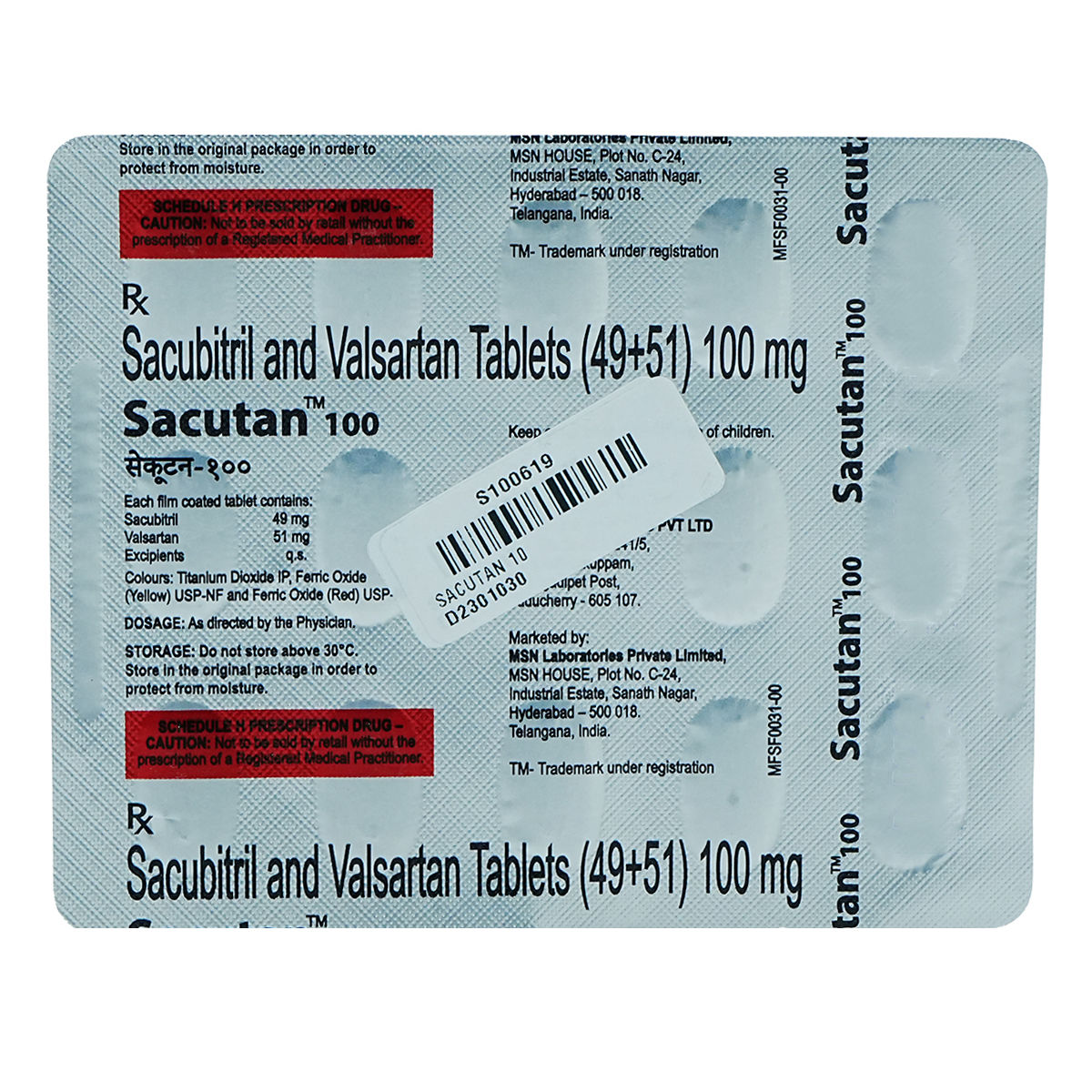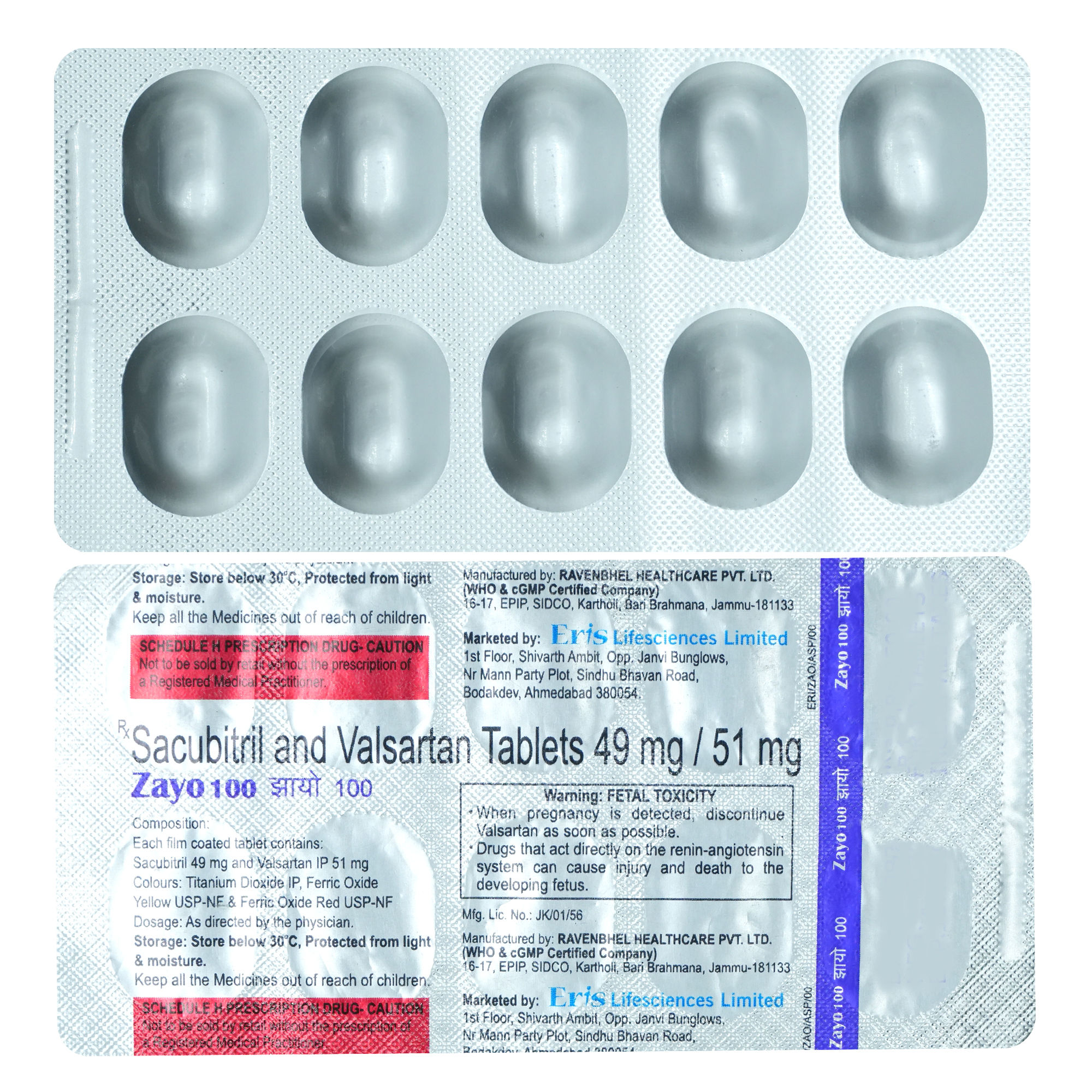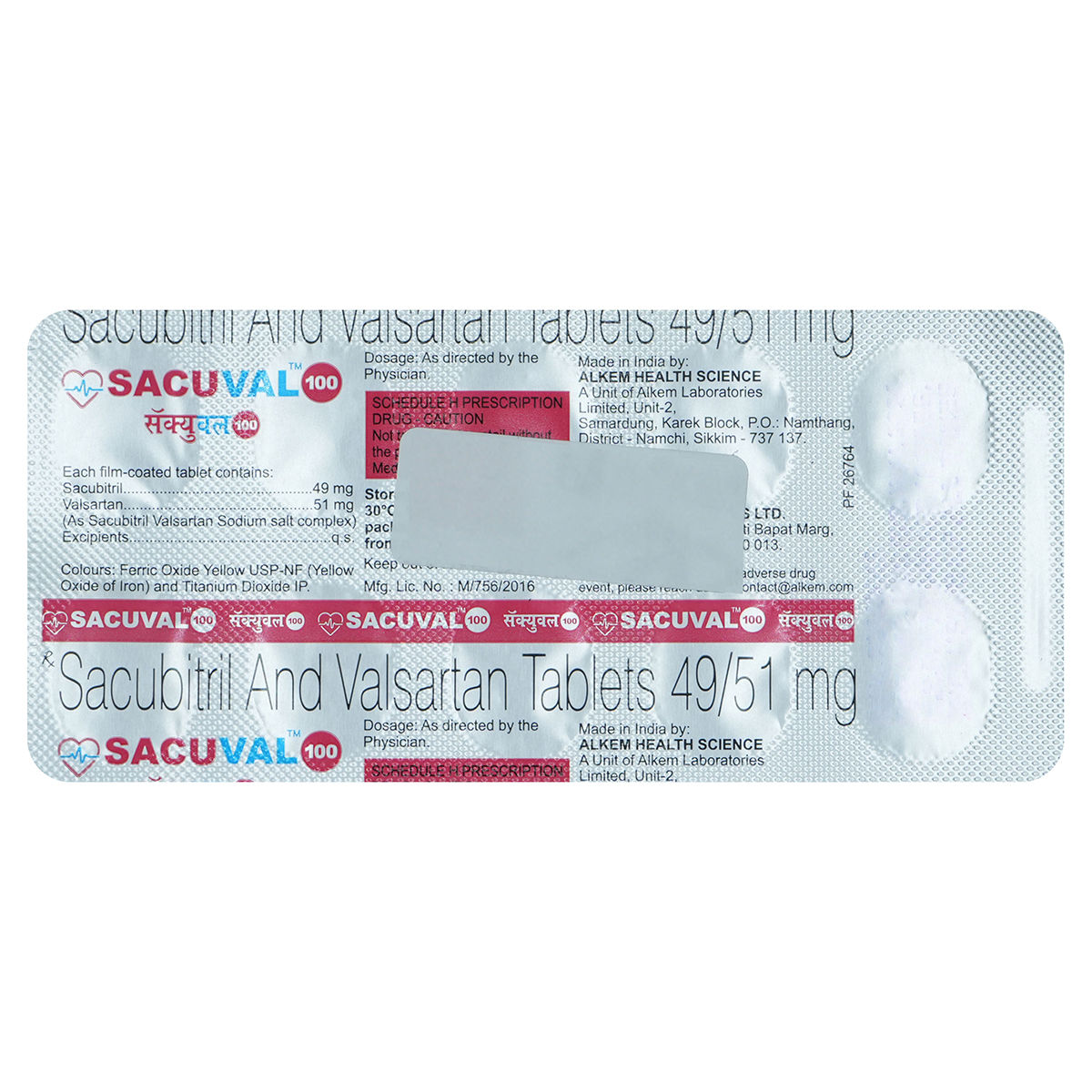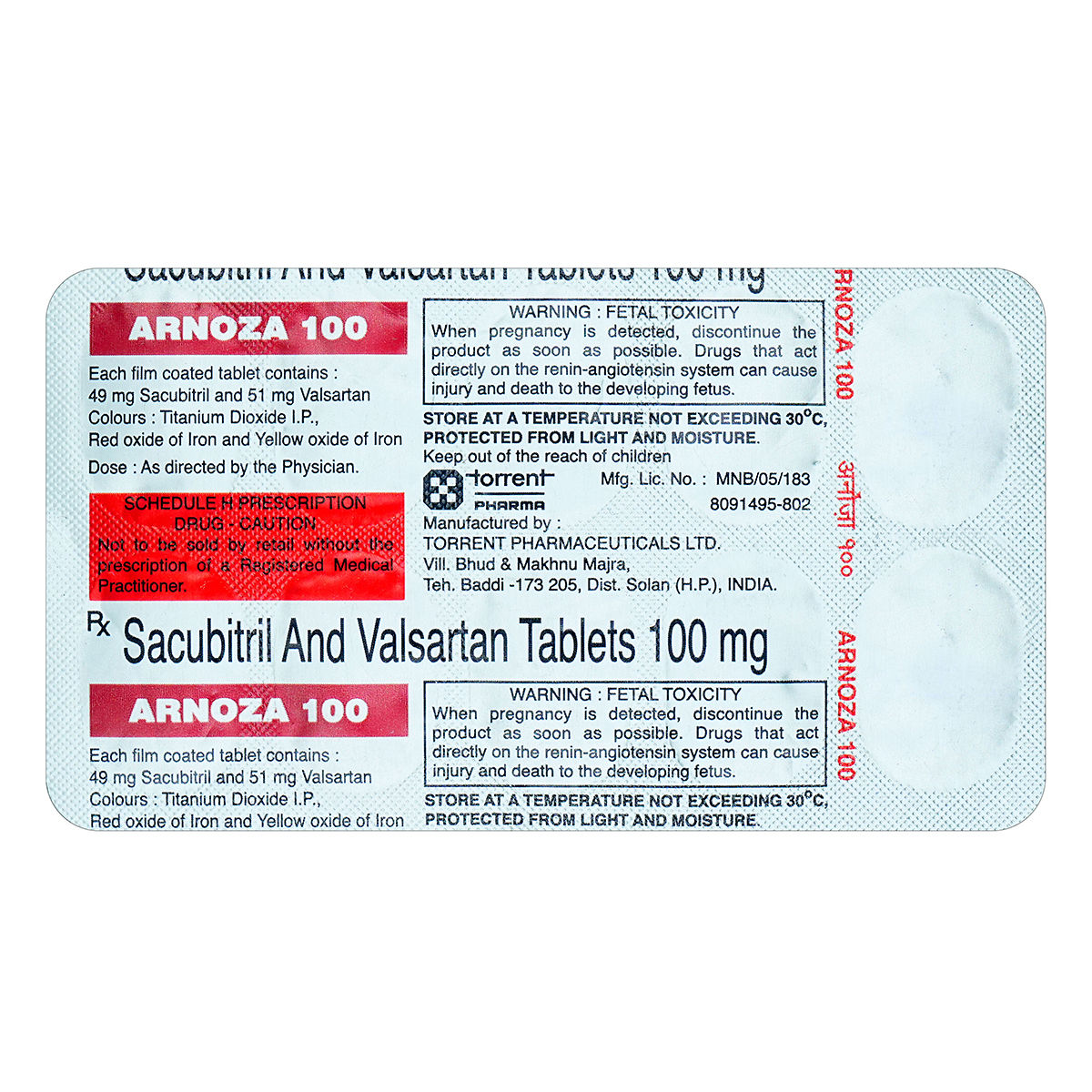Vymada 100 mg Tablet 14's
₹824.4*
MRP ₹916
10% off
₹778.6*
MRP ₹916
15% CB
₹137.4 cashback(15%)
Free Delivery
With Circle membership
(Inclusive of all Taxes)
This offer price is valid on orders above ₹800. Apply coupon PHARMA10/PHARMA18 (excluding restricted items)
Know Your Delivery Time
Provide Delivery Location





Available Offers
 Prescription drug
Prescription drugWhats That

Secure Payment

India's Most Trusted Pharmacy

Genuine Products
Composition :
Manufacturer/Marketer :
Consume Type :
Return Policy :
Expires on or after :
About Vymada 100 mg Tablet
Vymada 100 mg Tablet is used in the treatment of heart failure. It helps to reduce the risk of death and hospitalization in adults with chronic heart failure. Also, it can be used in children 1 to less than 18 years old to treat heart failure. Heart failure is a chronic condition in which the heart cannot pump blood as effectively as it should.
Vymada 100 mg Tablet is a combination of two medicines: Valsartan and sacubitril. Valsartan belongs to the class of drugs called angiotensin receptor blockers (ARBs) that block the effect of angiotensin II receptors that tighten the blood vessels. By blocking the effect of angiotensin II receptors, Valsartan makes it easier for the heart to pump blood to all body parts by relaxing and widening the blood vessels. Sacubitril belongs to the class of drugs known as neprilysin inhibitors, which work by relaxing and widening the blood vessels and making it easier for the heart to pump blood to all body parts. Together, Vymada 100 mg Tablet helps in the treatment of heart failure.
Take Vymada 100 mg Tablet with or without food or as directed by your doctor. Do not crush, chew or break the tablet; swallow it as a whole with a glass of water. You are advised to take Vymada 100 mg Tablet for as long as your doctor has prescribed it for you, depending on your medical condition. In some cases, you may experience certain common side effects, such as cough, dizziness, nausea, diarrhoea, and weakness. Most of these side effects do not require medical attention and will resolve gradually over time. However, you are advised to talk to your doctor if you experience these side effects persistently.
To treat your condition effectually, continue taking Vymada 100 mg Tablet for as long as your doctor has prescribed it. Try not to stop taking it on your own as it may cause a sudden increase the blood pressure, chest pain, or heart attack. Do not be reluctant to speak with your doctor if you experience any difficulty while taking Vymada 100 mg Tablet . Do not take Vymada 100 mg Tablet with ACE inhibitors (such as captopril or enalapril) since the risk of side effects may increase. Do not take Vymada 100 mg Tablet for at least 36 hours before or after taking an ACE inhibitor drug. Inform your doctor before taking Vymada 100 mg Tablet if you have kidney or liver problems, if you are pregnant or breastfeeding, or if you have a history of hereditary angioedema (rapid oedema or swelling beneath the area of skin).
Uses of Vymada 100 mg Tablet
Directions for Use
Medicinal Benefits
Vymada 100 mg Tablet is a combination of two medicines, Valsartan and sacubitril. Valsartan belongs to the class of drugs called angiotensin receptor blockers (ARBs) that block the effect of angiotensin II receptors that tighten the blood vessels. By blocking the effect of angiotensin II receptors, Valsartan makes it easier for the heart to pump blood to all body parts by relaxing and widening the blood vessels. Sacubitril belongs to the class of drugs known as neprilysin inhibitors, which work by relaxing and widening the blood vessels and making it easier for the heart to pump blood to all body parts. Vymada 100 mg Tablet helps in the treatment of certain types of heart failure. It may also help you to live longer and lower the frequency of hospitalizations for heart failure.
How Vymada 100 mg Tablet Works
Storage
Side Effects of Vymada 100 mg Tablet
Cough
Dizziness
Diarrhea
Fainting
Headache
Nausea
Stomach pain
Vertigo (sensation of feeling off-balance)
Weakness
What if I have taken an overdose of Vymada 100 mg Tablet
Drug Warnings
Keep your doctor informed if you have kidney or liver diseases. Discuss with your doctor if you are taking any other medicines along with Vymada 100 mg Tablet . Avoid smoking and alcohol consumption. Pregnant women and breastfeeding women should consult their doctor before taking Vymada 100 mg Tablet . A prolonged intake of Vymada 100 mg Tablet can cause an altered potassium level so, regular monitoring of potassium is required. Driving and operating heavy machinery should not be done as it may cause dizziness and drowsiness. Orthostatic hypotension (sudden lowering of blood pressure n standing) might occur, so patients using Vymada 100 mg Tablet should get up with caution. Speak to your doctor if you have diabetes before taking Vymada 100 mg Tablet . Inform your doctor about your current medicines such as aliskiren (medication to treat high blood pressure), any other heart or blood pressure medicines, lithium, mineral supplements that contain potassium. Inform your doctor if you feel light-headed or have little or no urination, rapid weight gain, swelling in your hands, feet, or ankles after taking Vymada 100 mg Tablet .
Drug-Drug Interactions
Drug-Drug Interactions
Login/Sign Up
Using Aliskiren together with Vymada 100 mg Tablet 14's may increase the risk of serious side effects (kidney problems, low blood pressure, or high potassium levels).
How to manage the interaction:
Taking Vymada 100 mg Tablet 14's with Aliskiren is not advised as it can result in an interaction, it can be taken if a doctor has advised it. You should seek medical attention if you experience nausea, vomiting, weakness, confusion, tingling of the hands and feet, feelings of heaviness in the legs, a weak pulse, or a slow or irregular heartbeat. Do not discontinue any medications without a doctor's advice.
The use of Triamterene and Vymada 100 mg Tablet 14's may increase the risk of side effects (low blood pressure, kidney function impairment, and hyperkalemia (high blood potassium).
How to manage the interaction:
Although taking Triamterene together with Vymada 100 mg Tablet 14's may result in an interaction, they can be taken together if prescribed by a doctor. However, contact a doctor immediately if you experience nausea, vomiting, weakness, confusion, tingling of the hands and feet, feelings of heaviness in the legs, a weak pulse, or a slow or irregular heartbeat. Do not discontinue any medication without consulting a doctor.
Co-administration of Potassium citrate with Vymada 100 mg Tablet 14's may increase the risk of side effects such as low blood pressure, kidney function impairment, and hyperkalemia (high blood potassium).
How to manage the interaction:
Although taking Potassium citrate together with Vymada 100 mg Tablet 14's may result in an interaction, they can be taken together if prescribed by a doctor. However, consult a doctor if you experience nausea, vomiting, weakness, disorientation, tingling in your hands and feet, feelings of heaviness in your legs, a weak pulse, or a slow or irregular heartbeat. Maintain proper fluid intake while taking these medications. Do not discontinue any medications without a doctor's advice.
The use of Captopril and Vymada 100 mg Tablet 14's can increase the risk or severity of side effects.
How to manage the interaction:
Although there is a possible interaction between Vymada 100 mg Tablet 14's and Captopril, you can take these medicines together if prescribed by a doctor. However, if you experience nausea, vomiting, weakness, confusion, tingling of the hands and feet, feelings of heaviness in the legs, a weak pulse, or a slow or irregular heartbeat, contact a doctor. Do not discontinue any medications without a doctor's advice.
Co-administration of Potassium chloride with Vymada 100 mg Tablet 14's may increase the risk of side effects (low blood pressure, kidney function impairment, and hyperkalemia (high blood potassium).
How to manage the interaction:
Although taking Potassium chloride together with Vymada 100 mg Tablet 14's may result in an interaction, they can be taken together if prescribed by a doctor. However, consult the doctor if you experience nausea, vomiting, weakness, disorientation, tingling in your hands and feet, feelings of heaviness in your legs, or irregular heartbeat. Do not discontinue any medications without a doctor's advice.
Co-administration of Potassium gluconate with Vymada 100 mg Tablet 14's may increase the risk of side effects (low blood pressure, kidney function impairment, and hyperkalemia (high blood potassium).
How to manage the interaction:
Although taking Potassium gluconate together with Vymada 100 mg Tablet 14's may result in an interaction, they can be taken together if prescribed by a doctor. However, contact a doctor immediately if you experience nausea, vomiting, weakness, confusion, tingling of the hands and feet, feelings of heaviness in the legs, a weak pulse, or a slow or irregular heartbeat, contact a doctor. Do not discontinue any medication without consulting a doctor.
Taking amiloride with Vymada 100 mg Tablet 14's may increase potassium levels in the blood. (High levels of potassium can cause hyperkalemia - high level of potassium in the blood, which can lead to kidney failure, muscular paralysis, and abnormal heart rhythms).
How to manage the interaction:
Although taking amiloride and Vymada 100 mg Tablet 14's together can result in an interaction, it can be taken if a doctor has prescribed it. However, consult a doctor if you experience nausea, vomiting, weakness, disorientation, tingling in your hands and feet, feelings of heaviness in your legs, a weak pulse, or a slow or irregular heartbeat. Do not discontinue any medications without a doctor's advice.
The use of Trandolapril and Vymada 100 mg Tablet 14's may increase the risk of side effects (low blood pressure, kidney function impairment, and hyperkalemia (high blood potassium).
How to manage the interaction:
Although taking Trandolapril together with Vymada 100 mg Tablet 14's may result in an interaction, they can be taken together if prescribed by a doctor. However, contact a doctor immediately if you experience symptoms such as nausea, vomiting, confusion, numbness, tingling in hands and feet, and irregular heartbeat. Do not discontinue any medication without consulting a doctor.
The use of Quinapril and Vymada 100 mg Tablet 14's may increase the risk of side effects (low blood pressure, kidney function impairment, and hyperkalemia (high blood potassium).
How to manage the interaction:
Although taking Quinapril together with Vymada 100 mg Tablet 14's may result in an interaction, they can be taken together if prescribed by a doctor. However, contact a doctor immediately if you experience signs and symptoms of hyperkalemia, such as nausea, vomiting, confusion, numbness, tingling in hands and feet, and irregular heartbeat, contact a doctor. Do not discontinue any medication without consulting a doctor.
Coadministration of Moexipril together with Vymada 100 mg Tablet 14's may increase the risk of side effects (blood pressure, kidney function impairment, and hyperkalemia (high blood potassium).
How to manage the interaction:
Although taking Moexipril together with Vymada 100 mg Tablet 14's may result in an interaction, they can be taken together if prescribed by a doctor. However, contact a doctor immediately if you experience symptoms such as nausea, vomiting, confusion, numbness, tingling in hands and feet, and irregular heartbeat, contact a doctor. Do not discontinue any medication without consulting a doctor.
Drug-Food Interactions
Drug-Food Interactions
Login/Sign Up
Lentils, Orange Juice, Oranges, Raisins, Potatoes, Salmon Dried, Spinach, Sweet Potatoes, Tomatoes, Coconut Water, Beans, Beetroot, Broccoli, Bananas, Apricots, Avocado, Yogurt
How to manage the interaction:
Co-administration of Vymada 100 mg Tablet 14's along with moderate-to-high dietary potassium intake, especially salt substitutes may lead to high potassium levels in the blood. Avoid taking potassium-containing salt substitutes or over-the-counter potassium supplements along with Vymada 100 mg Tablet 14's as this can lead to high potassium levels in blood. However, if you experience weakness, irregular heartbeat, confusion, tingling of the extremities, or feelings of heaviness in the legs, consult a doctor.
Diet & Lifestyle Advise
You are advised to consume low salt and low-fat diet while taking Vymada 100 mg Tablet .
Regular exercise is also recommended to complement treatment with Vymada 100 mg Tablet .
Eat a diet rich in whole grains, vegetables, fruits.
Avoid smoking and alcohol consumption.
Maintain a healthy weight with proper diet and exercise.
Managing stress with meditation, yoga, massage would also help in treating high blood pressure.
Habit Forming
Therapeutic Class
Vymada 100 mg Tablet Substitute

Azmarda 100 mg Tablet 14's
by AYUR
₹53.23per tabletCidmus 100 mg Tablet 14's
by AYUR
₹48.51per tabletNeptaz 100 mg Tablet 14's
₹34.52per tabletValentas 100 Tablet 10's
₹34.52per tabletSacurise 100 Tablet 14's
₹24.69per tablet
Product Substitutes
Alcohol
Caution
You are recommended to avoid alcohol consumption while taking Vymada 100 mg Tablet to avoid unpleasant side-effects.
Pregnancy
Unsafe
It is not recommended to take Vymada 100 mg Tablet while you are pregnant. Please consult your doctor. Your doctor will decide whether Vymada 100 mg Tablet can be given to pregnant women or not.
Breast Feeding
Unsafe
It is not recommended to take Vymada 100 mg Tablet while you are breast-feeding. Please consult your doctor. Your doctor will decide whether Vymada 100 mg Tablet can be given to breast-feeding mothers or not.
Driving
Caution
Vymada 100 mg Tablet may cause dizziness, do not drive or operate heavy machinery if you feel dizzy.
Liver
Caution
Dose adjustment may be needed. Vymada 100 mg Tablet should be used with caution in patients with liver impairment/liver disease.
Kidney
Caution
Dose adjustment may be needed. Vymada 100 mg Tablet should be used with caution in patients with kidney impairment/kidney disease.
Children
Unsafe
Vymada 100 mg Tablet can be used to treat heart failure in children who are at least 1 year old when prescribed by a child specialist
FAQs
Country of origin
Manufacturer/Marketer address
Customers Also Bought
Disclaimer
Author Details
We provide you with authentic, trustworthy and relevant information
Recommended for a 30-day course: 4 Strips







